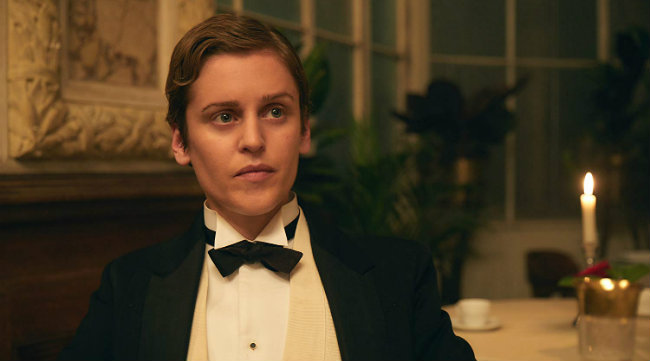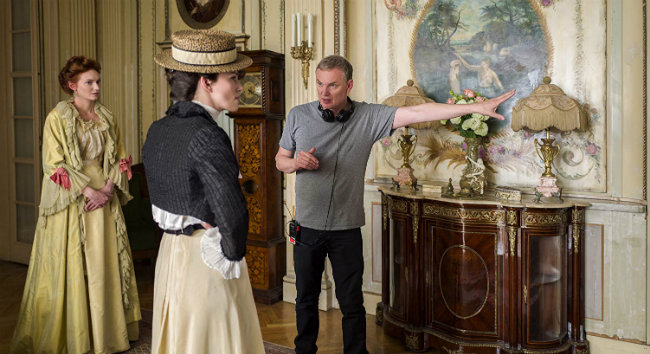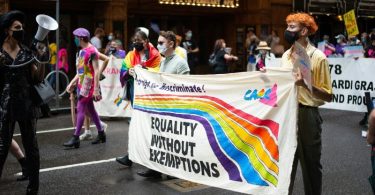British director Wash Westmoreland’s new film Colette is challenging the period drama genre with modern explorations of gender and sexuality.
The movie stars period drama icon Keira Knightley as the real-life French novelist Colette, coming into her own both as woman and storyteller at the dawn of the modern age.
It was Westmoreland’s late husband Richard Glatzer, who worked with Westmoreland on all of his films, including this one, who pushed him to tell Colette’s story on the big screen.
‘He was an avid reader,’ Westmoreland tells GSN. ‘He became a bit obsessed with Colette and would come to me saying, “Guess what she did next? Guess what she did next?”
‘This was his dream project — and he was actually born on the same day as Colette.’
The movie really champions women. Keira Knightley plays Colette in a relevant way — I think Colette would have been an advocate for the current Time’s Up movement.
It’s kind of extraordinary, the timing. Getting the movie made took many years.
The issues Colette was dealing with, having a man co-opt her work, having a man claim credit for her ideas, her going against the patriarchy to claim who she was — all these things, it’s so inspiring. It connects so much to today’s issues of Time’s Up, #MeToo, and LGBT visibility.
Westmoreland directing Knightley in the film | Photo: IMDB/Bleecker Street
The visibility in this film feels important. It’s based on real people and shows the fluidity of sexuality and gender expression is not a modern invention. Was that something you consciously thought about?
Absolutely.
One of the huge appeals to us was it’s this heterosexual story with this huge queer explosion. We [him and Glatzer] always looked for that in our stories.
It’s this cross-pollination of what a straight woman is experiencing, what a queer woman is experiencing, and this integration with a straight marriage is fascinating.
There’s a scene I keep going back to — Colette correcting her husband Willy (Dominic West) misgendering her genderqueer lover, Missy (Denish Gough). Did that really happen?
Missy is this extremely fascinating and brave historical figure, she really embraced masculinity as her identity. And before words really existed for the butch lesbian or transgender communities.
In real life, Missy was quite fluid with pronouns. In letters, Colette sometimes used a male pronoun for Missy and other times, used female pronouns. Between them, there was an intimate woman-to-woman romance, but also a deep appreciation for Missy’s masculinity.
That scene really shows how Colette respected Missy, especially in contrast to Willy as the other masculine figure in Colette’s life. He was about power, Missy’s embrace of masculinity was about an authentic display of self.

Gough as Missy | Photo: IMDB/Bleecker Street
It’s a powerful scene for people to see, especially today.
Everything about Colette was natural and direct. When she’s insisting Willy use male pronouns, it’s this simple statement of: ‘This is just the way it is.’
Like when Willy asks her about what’s happening in the bedroom with Missy. He says: ‘Isn’t something missing?’ And Colette looks at him and replies: ‘What do you mean?’
For Colette, she finds raw passion and connection with Missy, meanwhile Willy is going back to his naughty schoolgirl fetish and it’s so pathetic. And yet Colette is the one transgressing outside societal bounds, where Willy is sticking to the male playbook. It’s Colette’s ascension and Willy’s decline.
It really sends the simple but powerful message to be who you are and not who you think the world wants you to be.
She really goes for it and becomes an inspiration for us all.
You have cast transgender actors in cisgender roles, with very little fanfare. It’s not making headlines — it just is. They’re actors —
And they act! I have people come up to me about our trans actors and ask: ‘Which one was he?’ And I say: ‘Bingo.’
We had a transgender consultant on the movie, Christine Clark, to talk about Missy. During that time, I visited a transgender awareness workshop.
I talked to a lot of trans actors and all they wanted was for cisgender roles to be available to them. And this light went off in my head. I met some actors I really wanted to work with, and I just said, ‘Let’s do it. Let’s throw out the rulebook.’
Everyone’s invited to this party.

Wash Westmoreland | Photo: YouTube/THR
The period drama is my favorite movie genre but a lot of people see it as passive and out-of-touch. Colette feels very dynamic and modern. Is that something you wanted to do?
We wanted to buck the genre and the rules.
There’s something happening with period pieces. Lady Macbeth was an interesting piece that came out last year, The Favourite this year has genre-defying elements.
People then had real bodies and they belched and farted and fucked. French society was more open about that. Real people are here, just like you.
So many period pieces, you wait two hours for them to get engaged — the first bit of Colette, they’re in the barn making hay. And there are no negative consequences for women being sexual in this film.
And women have always been sexual!
Colette led the way. As a writer, she put ideas into the world. The young women who read Colette’s work Claudine, saw themselves in it.
Colette comes out this Friday, 21 September, in the US, and 25 January in the UK.







